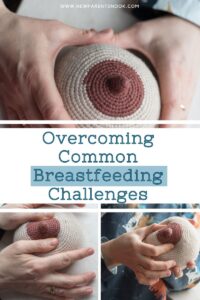Some links on our blog are affiliate links, meaning at no extra cost to you, we may earn a commission if you purchase through them. We participate in the Amazon Affiliate Program, and we recommend products we believe in. Your support helps us keep providing valuable content. Thank you!
Navigating the breastfeeding journey can bring up numerous questions and sometimes confusion.
Here, we address some of the most common queries and provide you with a list of resources to support your breastfeeding experience.
Frequently Asked Questions
Q: How often should I breastfeed my newborn?
A: Newborns typically need to be breastfed every 2-3 hours, including overnight. Look for hunger cues like lip smacking, sucking on hands, and restlessness as indicators that your baby is ready to feed, rather than watching the clock.
Q: Is it normal for breastfeeding to hurt?
A: While some discomfort in the first few days is common as you and your baby learn to latch properly, persistent pain is not normal. A proper latch should not hurt beyond the initial few seconds. If pain continues, consult a lactation consultant to check for issues like an improper latch or conditions like thrush.
Q: Can I still breastfeed if I return to work?
A: Yes, many mothers successfully continue breastfeeding after returning to work by pumping breast milk during the day. Planning ahead, discussing your needs with your employer, and establishing a pumping routine are key steps.
Q: How do I know if my baby is getting enough milk?
A: Signs that your baby is getting enough milk include regular wet and dirty diapers (six or more wet diapers and three to four bowel movements per day after the first week), steady weight gain (after the initial weight loss in the first few days), and a baby that seems satisfied and content after most feedings.
Q: Can I eat a normal diet while breastfeeding?
A: Yes, you can enjoy a wide variety of foods while breastfeeding. However, a balanced diet rich in nutrients is beneficial for your milk supply and energy levels. Some babies might react to certain foods in your diet, so it’s a good idea to pay attention to any changes in your baby’s behavior or digestion if you consume something new.
Resources
- La Leche League International (LLLI): A comprehensive resource offering support groups, a helpline, and a wealth of information on breastfeeding (www.llli.org).
- KellyMom: Founded by a lactation consultant, this website provides evidence-based information on breastfeeding, sleep, and parenting (www.kellymom.com).
- The American Academy of Pediatrics (AAP): Offers guidelines and articles on breastfeeding and child health (www.aap.org).
- The International Lactation Consultant Association (ILCA): Find a lactation consultant near you through their directory (www.ilca.org).
- Breastfeeding USA: Provides evidence-based information and support from trained breastfeeding counselors (www.breastfeedingusa.org).
Remember, while breastfeeding is natural, it takes time and patience to learn. Don’t hesitate to reach out for support and guidance along the way.
The journey of breastfeeding is unique for every mother and baby, and the most important thing is to find what works best for you and your family.







